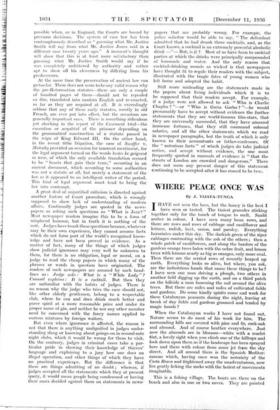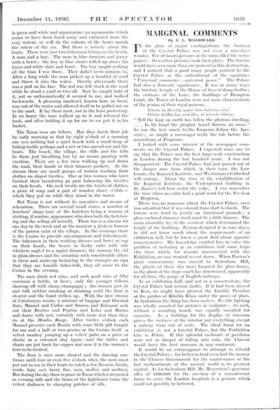WHERE PEACE ONCE WAS
By J. VIJAYA-TUNGA
HAVE not seen the bees, but the honey is the best I 1. have seen or tasted. The tiniest granules sticking together only for the touch of tongue to melt. Sunlit amber in colour. I have seen many bean rows, and there arc rows and rows of cabbage and cauliflower and lettuce, radish, beet, onion, and parsley. Everything luxuriates under this sky. The darkish green of the riper cabbages contrasting with the ash of the others ; then a whole patch of cauliflowers, and along the borders of the gardens orange trees laden with the ochre fruit, and lemon trees with lemons nearly as big as oranges, only more oval. Then there are the serried rows of recently heaped up earth. Everything looks so alive, but where, you ask, are the industrious hands that cause these things to be? I have seen one man driving a plough, two others in another field digging up the earth, and on a third patch on the hillside a man loosening the soil around the olive trees. But there are miles and miles of cultivated fields and gardens. Do some kindly spirits come and work for these Catalunyan peasants during the night, leaving at break of day fields and gardens groomed and tended by magic hands ?
When the Catalunyan works I have not found out. Nature seems to do most of his work for him. The surrounding hills are covered with pine and fir, cork-oak and almond. And of course heather everywhere. Just now the almonds are in blossom—white with a scarlet tint, a lovely sight when you climb one of the hilltops and look down upon them as if the landscape has been sprayed here and there with colour from some jet frem the sky direct. And all around there is the Spanish Mediter- ranean which, having once won the notoriety of the Costa Brava and frightened away the unadventurous, now lies gently licking the rocks with the laziest of movements imaginable.
This is a fishing village. The boats are there on the beach and also in one or• two coves. They are painted in green and white and aquamarine, an aquamarine which seems to have been lured away and extracted from the very waters, so well do the colours of the boats match the colour of the sea. But there is nobody about the boats. There were just two fishermen fishing on the beach. A man and a boy. The man in blue trousers and jersey with a beret ; the boy in blue shorts rolled up above his knees and white shirt and beret. The boy caught nothing all the time I was there. They didn't seem anxious to. After a long while the man picked up a handful of sand and threw it into the water. Shortly afterwards there was a pull on his line. The rod was left stuck in the sand while he stood a yard or two off. Now he caught hold of it, not so enthusiastically it seemed to me, and walked backwards. A gleaming mackerel, known here as barat, rose out of the water and allowed itself to be pulled out on to the sand. It lay there inert, not in the least protesting. In no hurry the man walked up to it and released 'the hook, and after holding it up for me to see put it in his basket.
The Tossa men are fishers. But they finish their job by early morning so that by eight o'clock of a morning one sees nothing but a quiet beach with a small heap of fishing tackle perhaps and a net or two spread out and the boats. The beach, the village, the cliffs and the hills lie there just breathing but by no means panting with exertion. There are a few men walking up and down the road, their hands in their trousers pockets. At the stream there are small groups of women washing their clothes on sloped trestles. One or two women who have finished their laundering go past balancing the trestles on their heads. On each trestle are the twists of clothes, a piece of soap and a pair of wooden shoes—s'elobs- which they put on while they stand in the water.
But Tossa is not without its amenities and means of relaxation. There are several small stores, a number of butchers' shops (one of the butchers being a woman of striking, if sombre, appearance who does both the butcher- ing and the selling all herself). There too is a cinema for One day in the week and at the moment a fiesta in honour of the patron saint of the village. In the evenings there is the Casino to provide entertainment and refreshment. The fishermen in their working dresses and beret or cap on their heads, the beaux in flashy suits with side whiskers angled to a rapier thinness, the women, the old in plain dresses and the senoritas with considerable allure' in dress and make-up betraying to the stranger no sign that they arc humble fisher-folk, they all come to the Casino in the evening.
The men drink red wine, and such good wine at fifty centimos a bottle, or beer;, only the younger fellows showing off with cheap champagne ; the women just sit and talk neither smoking or drinking until the, floor is cleared and the band Strikes up. With the first strains of Catalunyan music, a mixture of bagpipe and Oriental flute, Manuel and Carlos and Simion and Edouard seek out their Rositas and Pepitas and Loins and Marias and dance with zest, certainly with more 'zest than they do at the Moulin Rouge. After twelve o'clock each Manuel presents each Rosita with some little gift bought for one and a half or two pesetas at the Casino itself—a velvet monkey jumping up a velvet palm on a piece of elastic or a coloured clay figure—and the tables and chairs are but back for supper and now it is the women's turn to be treated.
The floor is once more cleared and the dancing con- tinues until four or even five o'clock when the men must put out to sea in their boats to catch a few llovarro, bonito, arada, boja, sari, barat, llus, ?zero, sardine and anchovy. But during the day there is peace in Tossa which is deepened as evening falls and the beam of the lighthouse turns the velvet darkness to changing patches of silk.

















































 Previous page
Previous page